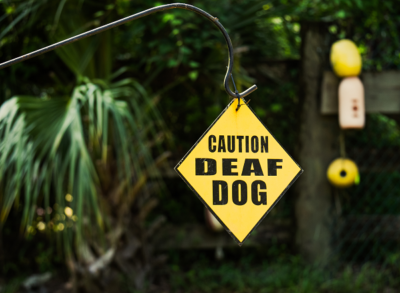
Petfinder initiated “Deaf Dog Awareness Week” to spread awareness about hearing loss in dogs and how to care for dogs affected by it. Although temporary, partial, or complete (both ears) deafness can affect many dogs, they still make warm, caring companions and trainable pets.
Causes of hearing loss in dogs
Severe and permanent deafness in dogs is caused by many of the same factors that cause deafness in humans, including injury to the ear, genetic defects, tumors, and old age.
Dogs may also experience temporary hearing loss due to an infection or excess wax build-up in their ear canals. Certain breeds are more susceptible to wax build-up because they have narrower ear canals (e.g., Dalmatian, Bull Terrier, Boxer) or more hair in and around their ears (e.g., Cocker Spaniel, Poodle, Maltese). Dogs with floppy ears and who enjoy swimming are also susceptible (e.g., Labrador Retriever, Golden Retriever, Newfoundland).
If you notice that your dog is less responsive to your calls or no longer comes running to familiar sounds (doorbell or food pouring into a dish), it’s time for a professional veterinary assessment. Your veterinarian can examine your dog’s ears to detect blockages, wax accumulation, injuries, or infections that may affect your dog’s hearing.
Caring for a hearing-impaired dog
Communicating with a deaf dog can be a challenge, but the following techniques can be used to help owners communicate with them:
- Train your dog to recognize hand signals instead of voice commands.
- Use a heavy stomp of the foot on the floor when you need to get your dog’s attention – they can often feel the vibration in the floor.
- To avoid startling your dog, gently tap or pet her to announce your entrance or exit from the room.
- Do not let your deaf dog wander alone outside unless you have a fenced yard. There are obvious dangers with your dog being near traffic or other hazards that she won’t be able to hear.
- Consider attaching a bell to your dog’s collar. This makes it easier to locate your dog quickly in the house or in the event of an escape. Your dog won’t be able to hear your calls to come back, but you will be able to hear her.
- Attach an “I’m Deaf” patch to your dog’s collar and harness to alert others as they approach.
How to help prevent deafness
Although some forms of deafness in dogs can’t be prevented or treated, there are steps you can take as a pet owner to help prevent temporary or avoidable forms of hearing loss:
- Try to prevent exposure to loud, startling noises, such as gunfire, heavy machinery, and loud music (all of which can cause anxiety and discomfort for your dog anyway).
- Monitor your dog’s ears for signs of infection and wax or hair build-up. Your veterinarian can treat the infection and clear the ear passages if necessary.
- At the first signs of hearing impairment, take your dog to the vet. Signs include failure to respond to noises and vocal commands, decreased ear movement, excessive barking, and voice changes. Your veterinarian will examine your dog and perform diagnostic tests to find the cause of hearing loss. If detected early, it may be possible to prevent permanent damage.
Deaf dogs require attention, support, and love. Despite their hearing loss, deaf pets can read our body language and pick up on various other sensory cues.
In honor of Deaf Dog Awareness Week, let’s also appreciate the devoted owners of deaf dogs who enjoy a rich and rewarding relationship with their pets.
